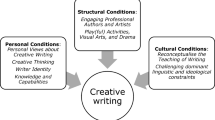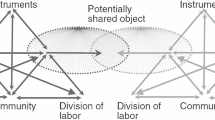Abstract
Ethnomathematics—we all have some notions of what it is, but should it be influencing school mathematics? This paper considers a justification for the influence from a constructivist perspective, and considers the implications of enactivism and other ways of thinking on ethnomathematics. My conclusion is that the influence should be broader—that different cultural groups may have different ways of knowing, that we may be asking the wrong questions, and that we might need to consider ‘ethno-education’
Kurżreferat
Wir alle haben eine Vorstellung davon, was Ethnomathematik ist, aber sollte sie die Schulmathematik beeinflussen? In diesem Beitrag wird dies aus einer konstruktivistischen Perspektive heraus bejaht Außerdem werden Auswirkungen des Enaktivismus und anderer Denkweisen auf die Ethnomathemtik betrachtet. Meine Schlussfolgerung ist die, dass der Einfluss umfassender sein sollte—dass unterschiedliche kulturelle Gruppen unterschiedliche Denkweisen haben können, dass wir die falschen Fragen stellen durfen, und dass wir eine “Ethno-Erziehung” in Betracht ziehen sollten
Similar content being viewed by others
References
Batchelor, Martine (1999). Thorsons Principles of Zen— London, Thorsons/Harper Collins
Belenky, Mary Field, Clinchy Blythe McVicker, Goldberger, Nancy Rule, Tarule, Jill Mattuck (1986). Women's Ways of Knowing. The Development of Self, Voice and Mind.—New York: Basic Books
Bell, Ing Powell (1979). Buddhist Sociology: Some Thoughts on the Convergence of Sociology and the eastern path of Liberation—In McNall, Scott G. (Ed.), Theoretical Perspectives in Sociology, New York, St Martins Press, pp. 53–68
Bertalanffy, Ludwig von (1968): General System Theory.— New York: Braziller (cited in Capra, 1996).
Bishop, Alan J. (1988) Mathematical Enculturation: A Cultural Perspective on Mathematics Education.— Dordrecht Kluwer Academic Publishers
Capra, Fritjof (1996). The web of life: a new synthesis of mind and matter.—London: Harper Collins
Damasion, Antonio R (1994). Descarte's Error: Emotion Reason, and the Human Brain.—New York: G. P. Putnam's Sons
D'Ambrosio, Ubitaran (1984). Socio-Cultural Bases for Mathematical Education.—In: Carss, Marjorie (1986) (Ed.), Proceedings of the Eifth International Congress on Mathematical Education. Boston: Birkhäuser
Davis, Brent (1996). Teaching Mathematics: towards a sound alternative.—New York: Garland
Dawson, Sandy (1999). The enactivist perspective on teacher development: ‘a path laid while walking’.—In: Jaworski B.; Wood T.; Dawson S. (Eds.), Mathematics teacher education: critical international perspectives. London: Falmer Press, pp. 148–162
Edelman, Gerald M. (1987): Neural Darwinism: the theory of neuronal group selection.—New York: Basic Books
Gilligan, Carol (1982). In a different voice: psychological theory and women's development.—Cambridge, MA: Harvard University Press
Kieren, Tom (1995): Teaching in the middle: enactivist view on teaching and learning mathematics.—Invited plenary at Queens/Gage Canadian National Mathematics Leadership Conference: Queens University (cited in Dawson, 1999).
Krishnamurti, Jiddu (1956). Education and the Significance of Life..—London: Victor Gollancz
Lakoff, George; Johnson, Mark (1999): Philosophy in the Flesh: The Embodied Mind and its Challenge to Western Thought.— New York: Basic Books
Maturana, Humberto, Varela, Francisco (1987): The Tree of Knowledge: The biological roots of human understanding.— Boston, MA: Shambhala Press
Merleau-Ponty, Maurice (1962): Phenomenology of Perception.— London: Routledge and Kegan Paul
Molino, Anthony (Ed.) (1998): The Couch and the Tree: Dialogues in Psychoanalysis and Buddhism.—New York: Farrar, Straus and Giroux
Nhat Hanh, Thich (1987): The Miracle of Mindfulness.—Boston, MA. Beacon Press translated by Mobi Ho, published in 1975 as Phép la cua su tinh thuc)
Plotkin, Henry C. (1998). Evolution in Mind: an introduction to evolutionary psychology.—Cambridge MA: Harvard University Press
Postman, Neil; Weingartner, Charles (1971): Teaching as a Subversive Activity.—Harmondsworth: Penguin
Sacks, Oliver (1995). A new vision of the mind.—In: Cornwell, John (Ed.), Nature's imagination: the frontiers of scientific vision. Oxford: Oxford University Press, pp. 101–121
Samura, Dennis J; Davis, Brent (1997). Enactivist Theory and Community Learning: towards a complexified understanding of action research.—In: Educational Action Research 5(3), pp. 403–422
Suzuki, Daisetz T.; Fromm, Erich; De Martino, Richard (1960): Zen Buddhism and psychoanalysis.—New York: Harper & Row
Varela, Francisco J.; Thompson, Evans; Rosch, Eleanor (1991): The Embodied Mind: Cognitive Science and Human Experience.—Cambridge MA: MIT Press
Author information
Authors and Affiliations
Rights and permissions
About this article
Cite this article
Begg, A. Ethnomathematics: Why, and what else?. ZDM 33, 71–74 (2001). https://doi.org/10.1007/BF02655697
Issue Date:
DOI: https://doi.org/10.1007/BF02655697




